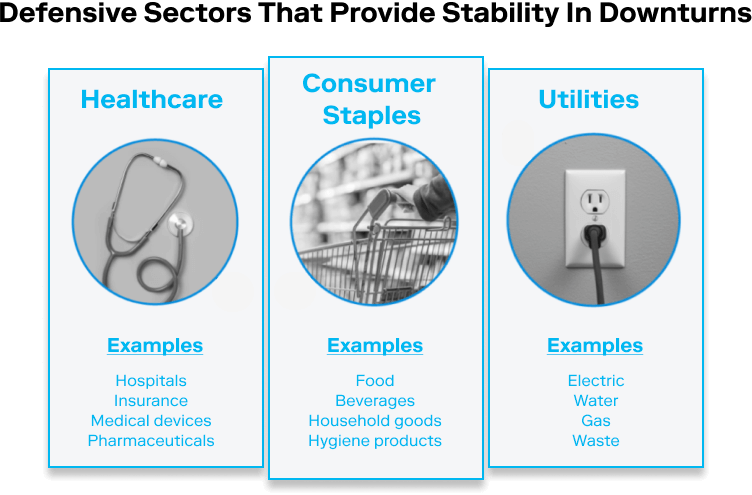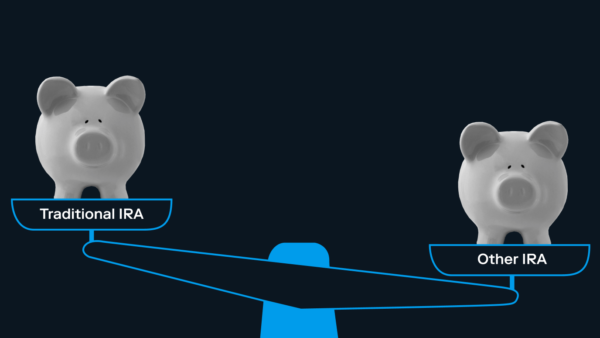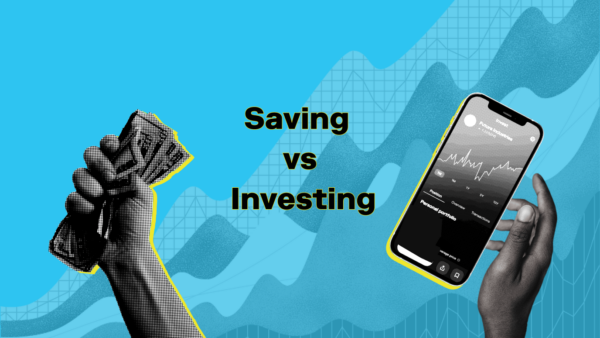Mar 8, 2023
What Are Defensive Stocks?

Defensive stocks are those that tend to provide stable earnings and consistent returns, even during an economic downturn. Shares of well-established companies in the consumer staples, utilities, and healthcare sectors are common examples of defensive stocks. These investments are considered more recession-proof than their cyclical stock cousins. While cyclical stock performance is usually more prone to changes based on consumer demand and systemic changes in the overall economy, industries in the defensive stock sectors are nearly always in demand because they provide essential products and services.
In this article, we’ll cover:
- The purpose of defensive stocks
- Advantages of defensive stocks
- Disadvantages of defensive stocks
- Defensive sectors to invest in
Defensive stocks’ role in your portfolio
Investing in defensive stocks may lower your overall risk as part of a diversified portfolio. As the name implies, they can act as a kind of protective shield that helps investors endure market downturns. They tend to have lower volatility and provide more stable earnings.
Many investors include defensive stocks in their portfolios to counterbalance potential losses from more volatile securities. Opinions about what percentage of your portfolio you should invest in defensive stocks vary wildly. Ultimately, it’s a personal decision based on your long-term goals and tolerance for risk.
Pros of defensive stocks
Generally speaking, investing in defensive stocks can be less risky than investing in cyclical stocks. Of course, any type of investing comes with risk, including the potential to lose money. But due to the consistently in-demand nature of goods and services associated with defensive stocks, they’re seen as less likely to drop in value during a stock market downturn or a recession.
Another advantage of defensive stocks’ low volatility is predictability. The return on defensive stocks is usually slow and steady, as are dividends if the company pays them, which can make it easier to predict how your investments will grow over time. That might be appealing if you’re working toward a specific financial goal or planning for retirement.
Cons of defensive stocks
On the flip side, the generally slow growth of defensive stocks often leads to smaller gains during a bull market. When other stocks are soaring, defensive stocks are more likely to perform below the market.
In a stock market downturn, owning defensive stocks may have advantages, but trading them can backfire. They may become overvalued during a recession because lots of people are snapping them up, driving up the share price for buyers.
Industries in the defensive sector
First things first: what’s the difference between a company, an industry, and a sector? Each term describes a piece of the economy, and companies are the smallest pieces. A collection of companies makes up an industry, and industries make up sectors. There are eleven sectors reflected in the US stock market; utilities, consumer staples, and healthcare represent the main defensive sectors. If you’re looking to invest in defensive stocks, you might want to consider shares in companies with a long track record of success in these sectors.

Companies in these sectors cater to people’s basic needs, providing goods and services that are in constant and consistent demand. In a recession, consumers tighten their belts, but they’re not likely to stop paying their electric bill, buying groceries, or skipping their prescriptions unless dire circumstances require it. Constant consumer demand means defensive stocks tend to have low volatility, stable earnings, and steady dividends through the ups and downs of the market; the consistency of consumer needs explains why these stocks maintain slow growth during a booming economy.
Utilities sector
The utilities sector includes electric, gas, and water utilities, as well as companies that operate as distributors or producers of those utilities. Renewable energy sources like solar panels and wind turbines are also included. Even in a recession, consumer spending on utilities is less likely to drop, so the value of stocks in this sector remain relatively stable.
Consumer staples sector
Companies in the consumer staples sector are often less sensitive to big economic fluctuations because people are unlikely, unwilling, or unable to cut these items out of their budgets, regardless of their financial situation. Companies that manufacture or distribute food, beverages, tobacco products, personal and hygiene products, and non-durable household goods make up the consumer staples sector. Unlike stocks in the consumer discretionary sector, which includes companies like car manufacturers and hotels, stocks in consumer staples tend to hold steady when people reduce their spending during a recession.
Healthcare sector
The healthcare sector includes businesses that provide medical services and insurance, manufacture medical equipment or drugs, and/or facilitate patient healthcare in hospitals, clinics, labs, and nursing homes. Because healthcare is a necessity and medicine and medical equipment are always in demand, this sector offers strong defensive investment opportunities.
Managing risk with defensive stocks + a diversified portfolio
Building a defensive investment strategy might help protect you from greater losses during a recession or economic downturn. Investing in defensive stocks is one starting point, but it’s just part of the puzzle; you can further reduce your risk with a diversified portfolio containing a variety of holdings that are not all subject to the same market risk.
With Stash, you can build a portfolio of many types of stocks, as well as exchange-traded funds (ETFs), bonds, and even cryptocurrency. And with the Stash Smart Portfolio™, you get automated investing tailored to your goals.

Investing made easy.
Start today with any dollar amount.

Defensive stocks FAQ
What stock sectors are considered defensive?
Utilities, consumer staples, and healthcare represent the main defensive sectors. These sectors are considered essential and typically maintain their income streams and overall stability even when the market is volatile.
What are examples of defensive stock?
Examples of defensive stocks include any essential items from defensive sectors like groceries, personal hygiene products, water, electricity, heating, and pharmaceuticals.
What is defensive vs cyclical stocks?
Defensive stocks are nearly always in demand because they provide essential products and services while cyclical stocks are affected by consumer demand and systemic changes like market downturns.
Related Articles

15 Largest AI Companies in 2024

The 12 Largest Cannabis Companies in 2024

What Is a Traditional IRA?

Saving vs. Investing: 2 Ways to Reach Your Financial Goals

How To Invest in the S&P 500: A Beginner’s Guide for 2024

Stock Market Holidays 2024





